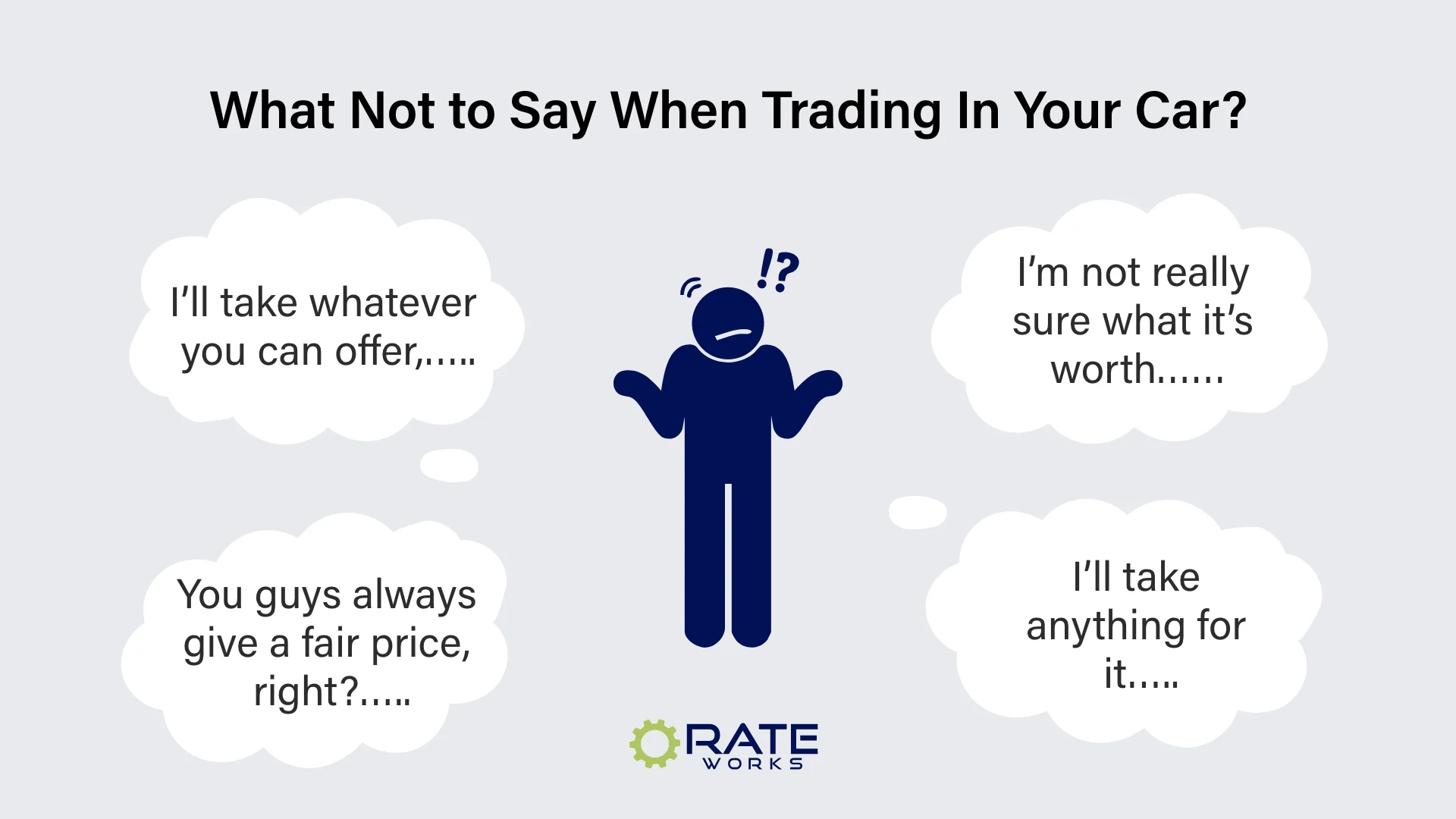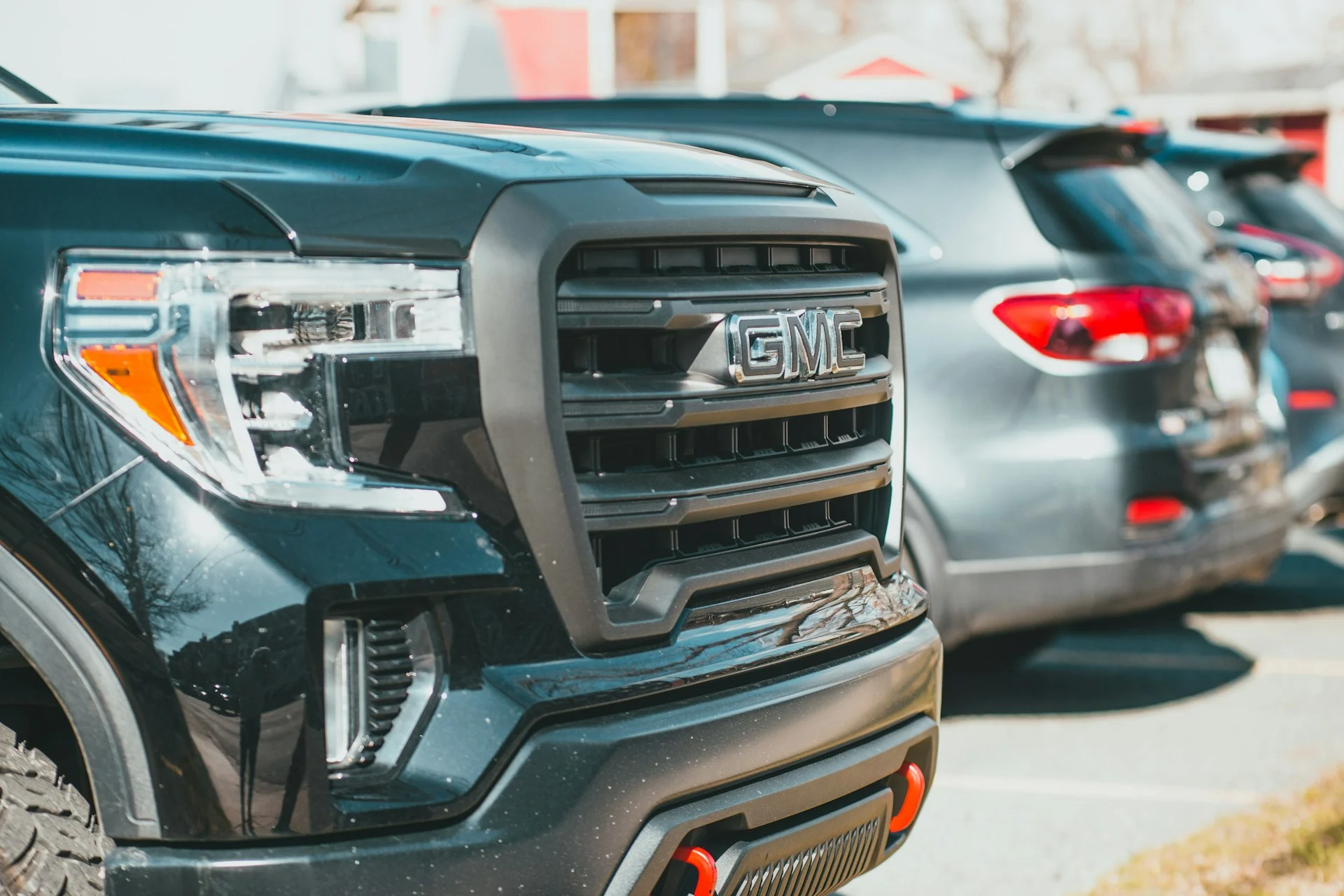Trading in your car can be a convenient way to reduce the cost of your next vehicle. It saves time, limits the hassle of selling privately, and can even help lower your financing needs. But while many people come prepared with pricing research and trade-in estimates, far fewer know what not to say when it’s time to negotiate.
In fact, over 90% of car buyers conduct extensive online research before heading to the dealership, but that research often focuses on the vehicle itself, not the conversation. In this blog, we’ll share some helpful guidance on what not to say when trading in your car. This information and taking the right approach can help you get more for your trade.

Things Not to Say
Okay, we know what you’re thinking: are we suggesting dishonesty? No, not at all. When asked specific questions about your vehicle’s condition or history, honesty is always the best policy. Not only is it the most ethical approach, but it can also help you avoid legal trouble down the line. That said, there’s a big difference between being truthful and offering up information that can hurt your negotiating position before it’s even necessary.
Here are a few types of phrases to avoid when trading in your car, and why they can work against you.
Phrases That Weaken Negotiating Power
Statements like “I’m hoping to get $5,000, but I’ll take whatever you can offer” or “I just want to get rid of it” tell the dealership that you're not holding out for a fair price. Once you show your hand, you’ve lost leverage. Instead, let the dealership make the first offer.
Phrases That Reveal Ignorance
Saying “I’m not really sure what it’s worth” or “I didn’t look anything up” can be costly. It signals to the dealer that you’re walking in blind. Even if you’ve done your homework, admitting you haven’t puts you at risk of accepting a lowball offer.
Phrases That Reveal Naivety
If you say, “You guys always give a fair price, right?” or “My friend said I should trust you,” it can come off as overly trusting. A fair deal often requires respectful back-and-forth. Trust us here that blind trust won’t get you there.
Phrases That Make You Sound Desperate
Comments like “I need this car gone today” or “I’ll take anything for it” put pressure on you, not the dealer. Desperation makes it easier for the dealership to justify a lower offer.
Phrases That Reveal Debt
Saying “I still owe more than it’s worth” or “I’m trying to get out from under this loan” shows you may be upside down on your current vehicle. If you are clearly underwater with negative equity, dealers may then offer even less, knowing you're in a tough spot.
Phrases That Reveal Urgency
If you say “I’ve already bought my next car” or “I’m moving tomorrow,” you’re telling the dealer that you don’t have time to shop around, making you more likely to accept whatever they offer.
Phrases That Reveal Issues With the Car
Being upfront when asked about known problems is important. But volunteering info like “It makes a weird noise sometimes” or “The check engine light just came on” before being asked can lower the trade-in value right away. Let the inspection do the talking unless you're directly asked.
What to Say Instead
Now that you know what not to say, let’s talk about what you should say when trading in your car. The goal is to protect your position and present your vehicle in the best possible light. Here's how to reframe your responses to keep the negotiation in your favor.
Instead of: “I’ll take whatever you can offer.”
Say: “I’ve done some research and have a general idea of its market value.” This signals that you’ve come prepared and won’t accept a low offer without question.
Instead of: “I’m not really sure what it’s worth.”
Say: “I used a few online tools to get an estimate of the trade-in value.” Even if your estimate isn’t exact, showing that you’ve looked into it makes a difference.
Instead of: “You guys always give a fair price, right?”
Say: “I’m hoping we can find a trade-in value that reflects the car’s condition and market demand.” This keeps the tone respectful but lets the dealer know you’re here to have a real discussion.
Instead of: “I need this car gone today.”
Say: “I’m exploring my options and want to see what kind of trade-in value is available.” This keeps your timeline flexible and shows you’re not rushing into a decision.
Instead of: “I still owe more than it’s worth.”
Say: “I’m looking to trade this in as part of my next purchase and am reviewing the best way to do that.” This acknowledges your situation without giving away too much financial vulnerability.
Instead of: “I’ve already bought my next car.”
Say: “I’m looking to trade in and purchase, and I’m comparing offers.” This keeps the dealer motivated to give you a strong deal while maintaining your leverage.
Instead of: “It makes a weird noise sometimes.”
Say: “It’s in good condition and has been regularly maintained.” Wait for the dealer’s inspection to surface any issues. If asked directly, be honest. The point is that there’s no need to lead with negatives.

Negotiating Tips For Trading in Your Car
Approximately 22% of used car sales and 43% of new car transactions involve a trade-in, based on data from the past several years. That means nearly half of all new car buyers are navigating trade-in negotiations. However, many walk in without a clear strategy. Whether you're aiming to reduce your next car payment or simply get the best return on your vehicle, knowing how to negotiate can make a big difference.
Here are some practical tips for negotiating your trade-in:
- Know your car’s value: Use online search tools such as Kelley Blue Book, Edmunds, J.D. Power, or NADA Guides to get a realistic estimate of your car’s trade-in value before visiting the dealership.
- Let the dealer make the first offer: Don’t start the conversation with your number. Give the dealer a chance to appraise the vehicle and share their initial offer.
Negotiate your trade-in separately: Keep the trade-in conversation separate from the new car purchase to avoid confusing pricing tactics or bundled negotiations. - Avoid revealing personal financial details: Don’t mention how much you owe on your current loan or whether you’ve already bought your next vehicle. These details can reduce your leverage.
- Highlight your car’s strengths: Point out well-documented maintenance, recent repairs, or upgrades like new tires. It’s important to mention anything that adds value in the dealer’s eyes.
- Understand the dealership’s perspective: Dealers want trade-ins that are easy to recondition and resell. Low mileage, good condition, and popular models tend to get higher offers.
RateWorks Offers Auto Refinancing
Trading in your vehicle can be a good course of action when it's time for a new or new-to-you vehicle, but saying the wrong thing could cost you. In this article, we covered what not to say when trading in a car, what to say instead, and tips for negotiating a fair offer.
If you're looking to reduce your monthly car expenses even further, RateWorks offers auto refinancing options that may help lower your payment or interest rate. A few well-thought-out moves now can add up to big savings later.


.webp)









